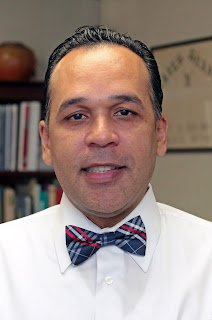 |
| Guest speaker Betty Colonomos and BU faculty Jessica Bentley-Sassaman and Kristin Lizor |
This event, Self-Sabotage: How Do Interpreters Prevent Fear from Creating Indecision? was partially funded by the College of Education’s Special Initiative Fund, the Pennsylvania chapter of the Registry of Interpreters for the Deaf and Sign Language Interpreting Professionals. This training was conducted in ASL by all participants and attended by a mix of interpreting students, pre-certified and certified interpreters, and a deaf interpreter.
The training offered an introspective look at how interpreters sabotage themselves through negative self-talk. As interpreters, there is an expectation of perfection, even though research has proven simultaneous interpretations (which is not “simultaneous,” but a few seconds behind the speaker) is about 87 percent accurate (Russel, 2005, p. 151).
For one activity, groups formed according to experience: seasoned, experienced, or new/student. It was interesting to see that fears about mistakes during interpretation are the same for members of all three groups. This realization helped participants understand that all interpreters have similar fears, no matter how many years they have been in the field.
The goal of this introspection and the thought-provoking activities that followed was to reconsider the decision-making process and use the knowledge to provide high-quality interpreting services for the deaf community. The training also focused on how we can build communities through communicating with one another. This training was astounding and Betty Colonomos is a great presenter who makes interpreters reconsider their approach to interpreting.
Students who attended the event wrote about their experiences:
I really enjoyed being in this workshop with fellow students as well as interpreters with varying years of experience. This workshop opened to my eyes to the fears and anxieties that are present in our occupation. Betty created a safe atmosphere where participants were encouraged to analyze the root of their anxieties and how to utilize different controls to subdue them. The small group discussions and hands-on activities were also beneficial. Mrs. Colonomos promoted positive change within the interpreting community; we should strive to support and encourage each other. As a student, I thoroughly enjoyed this workshop because of the advice, critical thinking, and support from everyone involved. — Cassidy Sangrey ’16.
The StreetLeverage Workshop that was held on October 24 and 25, 2015 was a wonderful experience! I thoroughly enjoyed working with different people with different backgrounds and learning from them as the workshop leader, Betty Colonomos. The workshop focused on discussing our fears and self-sabotage. It was interesting to learn that both new and experienced interpreters shared similar fears. — Betsy Lacey ’16.
This innovative training was as beneficial for new interpreters as it was for experienced interpreters and an all-around amazing experience. It was engaging mentally as interpreters were challenged to rethink their approaches, rethink how they make decisions and communicate with their teammates, and rethink how to incorporate the deaf community into the decision making.
— Jessica Bentley-Sassaman
Russell, D. (2005). Consecutive and simultaneous interpreting. In T. Janzen (Ed.), Topics in signed language interpreting (pp. 135-364). Philadelphia, PA: Jon Benjamins.







